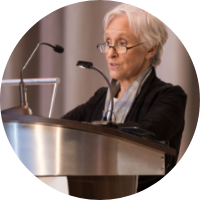
Did you choose retirement? Or was it chosen for you?
By mutual agreement.
How was the transition from the working world to retirement?
I haven’t figured out how to retire, likely because it doesn’t suit me in its conventional form.
Current work life is an expansion on aspects of the previous conventionally employed one.
The challenge is controlling that expansion!
Looking back, what do you wish you knew about retirement before you retired?
How good life is in the absence of an overlord.
So far, what has surprised you most about retirement?
Demand for my experience and knowledge; time-management takes on great importance.
What’s your best advice for someone in their 20s/30s?
Draw on the experience and knowledge of your mature coworkers and colleagues for guidance in navigating jobs and balancing life. Consulting them openly can spare you reinventing wheels.
Advice to retirees:
We gain by not pontificating to younger colleagues; instead, foster them to perform in their own new and different times. Give perspective and guidance as part of the process of handing over leadership and bringing ourselves the satisfaction of knowing we are in good hands going forward.
What do you enjoy most about being retired?
Not being retired.
What’s the biggest challenge you have confronted to this point in your retirement?
Taking on too many commitments.
How do you stay connected to the chemistry enterprise as a retiree?
- Associate editor of the Beilstein Journal of Nanotechnology
- Silicon Valley ACS – numerous roles
- Science advisor in cheminformatics at Google and at Digital Science Dimensions Life Sciences & Chemistry
- InChI Trust Organometallic subcommittee
- Caltech Alumni activity
What’s a travel destination you can’t wait to get back to?
Basel, Switzerland (used to live there)
What do you like most about where you are living in retirement?
We’ve remained in the San Francisco Bay area, close to current occupations and local civic/community/ACS/iNaturalist/academic groups.
What’s one thing you wish you could change about where you live?
Type A personalities of Silicon Valley
What guidance do you have for people who are getting ready to retire?
Take a look at the lifestyles of those who have retired before you—emulate those you admire.

I’ve flunked retirement. Twice, maybe more—enough to question the definition of retirement.
“Retirement” got renamed to “redirection” as I focus beyond the atomic force microscopy of my IBM Research lab. Since I ran that lab with a mix of collaboration and education among visiting scientists, students, and colleagues, a number of those strands continue for staying connected to the chemistry enterprise. And to diverge. Now together with data science and coding experts up the street at Google, I have the satisfaction of seeing my years of experience in chemistry and materials and instrumentation manifest as guidance for advanced search, machine-learning, and predictive analytics.
I began my career in 1980 at Allied Corporate Laboratories (now Honeywell) where, motivated to perform mechanistic studies on recently discovered electronically conducting polymers, I discovered and studied their solution state. In 1986 I joined IBM Research—a nexus for scanning probe invention—where, together with instrumentalists, we demonstrated unambiguously the ability to image and manipulate single molecules with STM (scanning tunneling microscopy). On a multiyear assignment to the University of Basel Physics Institute in the early 90s, my academic team expanded the capability of scanning probes into measuring functional properties of organic monolayers with AFM (atomic force microscopy).
I am an avid mentor to high school and college students, most of whom are first in their families to seek a higher education. I am a Fellow of the American Chemical Society, the 2017 recipient of the ACS Award in Industrial Chemistry, and the 2020 recipient of the Perkin Medal.
I obtained a BS in chemistry from Tufts University while performing bio-organic undergraduate research at MIT. After graduation, I worked in vitamin D research at Mass General Hospital. I earned a PhD from Caltech, studying transition-metal functionalized polymers and organometallic cluster compounds as models for Fischer-Tropsch catalysis.
This article has been edited for length and clarity. The opinions expressed in this article are the author's own and do not necessarily reflect the view of their employer or the American Chemical Society.











